Atomic Society is a post-apocalyptic town building game where you set the laws.
Society is dead. So remake it. Build and rule your own post-apocalyptic society. Decide the laws and morals of the survivors. Overcome challenges and threats from the wasteland.
What kind of society will you make?
Your goal in Atomic Society is to build a large settlement that can keep hundreds of survivors alive in a harsh wasteland. Expand carefully and overcome challenges from a dangerous and desolate world. Decide what laws and values your town will have. Create a society that others will admire or dread.
Atomic Society is now available Steam. Check it out here.
Our dev blogs cover the making of the game from our earliest prototype to the present day, talking about what it's like making your first ever game, and what new features are coming next.
Post Apocalyptic Town Building Where You Set The Laws
Can you rebuild a town that can keep hundreds of people alive after a nuclear war?
What kind of laws would you set - and how would you enforce them?
- SURVIVE. Starting out with nothing, slowly build a large settlement that can keep hundreds of people fed, watered, healthy, housed and entertained... if you can.
- CRIME. Citizens commit crimes and enact a wide range of social issues as you play.
- JUDGE. Act as judge over a range of real-world social issues including abortion, murder, vegetarianism, drug use, cannibalism, and several other controversial topics.
- PUNISH. Choose execute, long or short prison sentences, toleration and even encouragement for all issues that happen in your town.
- CONTROL. Create and control your own leader character. Use this person to help build your town, or explore the world for salvage and upgrades. Walk around your town up close.
- BELIEVE. Pick what you believe and share that with others through violence, exile or education.
- EXPAND. Convert ruined houses and offices into useful buildings or loot them for supplies. Research new buildings and trade excess goods.
Useful Links:
You can learn more about the game on our website, including work-in-progress videos.
The Beginner's Guide to Making a Video Game!
I can't believe we've come to this point.
In a sense, Atomic Society has been decades in the making. About 20 years ago, as a teenager, I pitched it to a British game developer, thinking that they would take ideas from a random person off the street. They didn’t of course, but they did give me a job as a tester instead.
However, 3 years as a tester was enough to convince me I didn't want to work in the AAA games industry, so I moved on with my life, and Atomic Society stayed as a daydream.
Then in 2014, a friend told me about this "free" game engine named Unity. I gave it a go and realised even an idiot like me could cobble something together that looked vaguely like a video game at home. This was only a year after Valve had introduced the Early Access system. Greenlight was still a thing back then. The indie game market was opening up and I wanted to ride the hype-train.
Naturally, I had no idea how to code, so I naïvely went onto Reddit and asked does anybody want to make a game. The internet is full of horror stories about amateur game dev teams falling apart. Obviously we haven't, and the one thing that worked was just picking the person I liked the most (Nick), someone I could gel with. Without friendship and ease of communication, we would've never made it. Anything else can be learnt.
The next hurdle was finding a 3D artist who would also work for free. Fortunately my wife saw what Nick and I were doing and thought it looked interesting. So she went and learnt Blender (a free modelling program) and taught herself 3D art, just like that. That was lucky.
Afterwards I contacted an old guildmate from World of Warcraft who made music in his spare time and asked if he’d help us with the soundtrack, if I promised to pay him back later. Thankfully he said yes.
It seemed we had all you needed to make a game: A designer/producer type person, a coder, a music guy, and an artist. And lots of spare time. What could go wrong?
We foolishly pencilled in just 3 years dev time and set to work.
We didn't realise it was going to take twice as long...
The Journey Begins
Gradually we all adjusted to the new way of life: work by day, game dev by night.
Things were fun and exciting at first but after about 8 months the sheer scope of the idea started to kick in. It became apparent we were never going to finish a game like Atomic Society if we didn't find a second coder. So it was back to Reddit again.
Fortunately I struck gold again and found a guy named Adam – who lived across the Atlantic – to join our unpaid ship of fools. He'd never made a game before either, but he had the right personality, and that's what counts.
Now we were getting somewhere: Nick could focus on systems while Adam made the gameplay features.
Then after a mere 14 months of learning the ropes, we had something that vaguely resembled a video game, at least if you didn't look too closely, or expect to enjoy it.
We took this scrappy prototype to Kickstarter with an extremely optimistic £70k fundraising goal and presented the game to the world for the first time.
And that's when realised we weren't going to be one of those amazing indie success stories you see in those documentaries. Our Kickstarter flopped and only earned about £3k.
The reception on Steam was much better admittedly, and we cruised through Greenlight, but it was a worrying sign.
Wiser devs have told me since that we should've given up at that point and chosen a different idea. Perhaps they were right, but I was in love with this idea, and we couldn't chuck away 14 months work.
So we decided to keep going and released what we had to little fanfare on our website.
We sold about 20 copies a month.
But that was great! At least to people who'd never sold something they'd made by hand before.
However, there was no turning back after that. We would never abandon a game after people had spent money on it. We had an audience to serve, albeit a tiny but loyal one.
Atomic Society had be finished, no matter what. We believed in it that much.
Reality Bites
Having release on our website, little did I know it was going take a whole extra 2.5 years of work before the game was ready for its Early Access debut!
Why has it taken so long?
Partly because of real-life troubles. Work, family and health get in the way.
But the biggest time-sink was the mistakes that come with making your first ever game. For example, I slowly realised that Atomic Society was actually two game ideas in one - a society-building one and a town-builder one. It was extremely difficult to do both ideas justice and took an immense amount of work.
I was also bewitched by player feedback. Obviously you want to keep the audience satisfied, but I didn't realise doing nothing can be better than not living up to expectations. For example, we had many requests to add in combat and raiders (which would make the game a town, society and combat game in one!). Naturally we couldn't do 3 games in one, so we did a story thing with the raiders. That still took months and naturally wasn't what combat-hungry players liked, so in the end all this work became an optional bonus feature. There's been so many detours like that.
Coding problems added up too. Implementing a saving and loading system 18 months after starting the project (rather than at the start) took ages. And so many systems have had to be rebuilt from scratch as well because we just didn't know where we were going at the time. We've also had nightmares with 3D pathfinding, especially as we're stuck using a lot of third-party tools. AI navigation is one of the trickiest things in game development and over a year of Nick's life has been devoted to this one aspect of the game.
Then there've been things that turned out to be far harder than expected, like last year when we had to scrap a 90% complete feature after 6 months because the last 10% was too much. That was a real low-point. A lot of time and money has gone down the drain.
All these delays are expensive, emotionally and financially. Making indie games from home is cheap but still has costs. PC hardware blows up, you need a website, company email address, and online repository to upload content changes. We also have to pay for a business bank account and accountant. And most importantly we had to stay friendly with each other, no matter what mistakes were made.
Throughout these early years, the main thing that kept us going was the hope that the game might be a success on Steam, even though its Kickstarter had flopped. But it was a tense guessing game. We had no idea if the work would ever find an audience.
Our hopes increased though when a famous YouTuber made a video about the pre-alpha version (without us even asking him to). Overnight that quadrupled our sales. It also boosted our wishlist numbers into viable territory. Perhaps this crazy idea was going to be mildly successful after all?
A few publishers must've thought so, as following that video suddenly we were contacted by various companies who wanted to help us out. We had a small taste of popularity.
However, for better or worse, we turned them all down because we wanted to work at our own pace, and publishers don't work for free either.
After about 4 years of work by this point, we were too attached. We still wanted to do things our way. That has good points - it's the independent spirit - but it also has downsides...
Finishing the Fight
I still haven't recovered from our Early Access release in October 2018. I didn't know how shy and reclusive I can be until I had to do marketing!
However through gritted teeth I did what publicity I could, and after nearly 4 years of work we were ready - or fed up enough - to put the game on Steam and see what happened. It was time to face the wider public.
I can't say I enjoyed the launch. It was terrifying and exhausting and I was pretty much a wreck from nerves and working overtime by the time we hit the release button.
Thankfully our prayers were answered. The game sold. The stars aligned. People showed up! All that dreaming and hoping finally paid off.
We sold more on the first day than our entire 2.5 years of being a pre-alpha. Nobody on the team could believe it. It was incredibly exciting and rewarding, but then it started to sink in that the journey was far from over. We hadn't finished. This was just a new beginning. And not everybody was happy with the first ever Steam version of our game.
There was an insane amount of player feedback and a real pressure to come up with the goods in a timely manner.
And I soon realised I didn't have the answer to a very important question: when is this game actually "finished"?
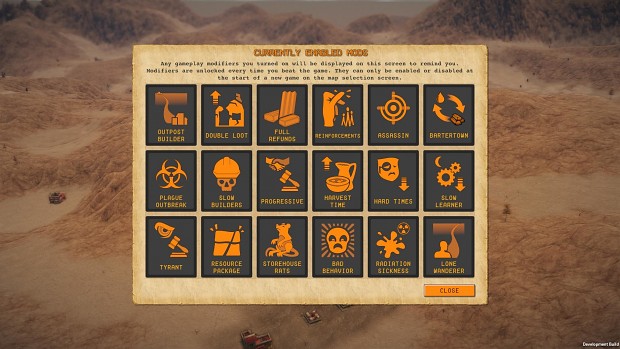
How can you finish a race if there isn't a finishing line?
It turned out the finishing line can't be whenever you put in every idea you or a player has, because that day never comes. Ideas are endless. And as we didn't have a publisher, and were self-funding, we could've technically continued until death.
Early Access proved to be the hardest part of the journey. Months rolled by as we kept trying to create the magical version that would make the game seem finished. It never came. In fact the finishing line seemed further away.
After a year on Early Access, sales and hype dried up. Our review score started to wobble as people became impatient. Team morale started to fade because 5+ years is a long time to stay energised and invested in anything, and what we did add in Early Access didn't seem to make a huge difference.
I was starting to despair, and to be honest, if I hadn't written about all last year in a blog, and if another experienced game developer (Tomer Barkin from Suncrash Studio) hadn't read it by chance and told me what to do, we might've never finished the game.
Thankfully Tomer gave me some hard-earned lessons pointed me in the right direction again.
I didn't realise that when you release on Steam, even in Early Access, the creative phase is essentially over. No more daydreaming. Now the developer's job is now just to fix complaints bit by bit, until one by one, until the players are satisfied with what you've offered them. When you launch to a big audience, the game belongs to them.
So we abandoned our never-ending idea list (mostly) and turned instead to what players were telling us instead. The Early Access audience was going to be our guide to finishing the game. Not every idea a random player had, but what they didn't like.
And that is how we've spent the last, and final year of game development: fixing what players didn't like.
Suddenly we were making progress again because we had a direction, and our review score started climbing.
But it's been the most gruelling 12 months. Partly because 2020 was brutal for many reasons. Partly because giving up your own vision is difficult. And mostly because we were exhausted!
However we didn't give up even as another Christmas rolled by, and through sheer bloody perseverance we managed to solve the big remaining problems, and double the game's length in the process.
It worked. Everything I've heard from people about the latest version is really positive.
Could it be that after 6.5 years in total, Atomic Society is finally ready? It better be!
Stuff I Wish I'd Known...
Before I wrap this up, I asked our little team for their top 2-3 tips now we've come to the finishing line:
My Tips (Designer/Producer):
- Games essentially involve doing the same thing over and over again, that whole “30 seconds of fun” thing might be cutting it a bit short. I’d say it’s 60 seconds of fun, but that’s all a game is. A game is doing something fun over and over again. I didn’t realise this at the start. I had really big picture ideas when I should've been focused on the moment-to-moment fun.
- As mentioned before, find the one thing your game is about and focus on that. Don't make 3 games in one. At least if you want to finish it in a decade!
- This rule has never been proved wrong – everything takes twice as long as you think it will. So if you think your game will take 3 years to make. It will take 6. If you think a feature will take a month, it will take 2.
Mariana’s Tips (Artist)
- Animations aren't worth the effort - unless you find yourself loving the process, buy them off the asset store, or avoid them.
- Perfection is the enemy of progress - get it done, get all your tasks done, THEN worry about making stuff look greater. You won't have time (and you're not getting paid!) to spend a week on a single model, use your time wisely. Atomic Society has over 100 (?) 3d models alone, plus UI, artwork, etc.
- Choose what you want to be responsible for - if you're in charge of art, fight to get your point across to the designer/programmers. If you're not in charge of e.g. design, let the designer have the last word.
Nick’s Tips (Lead Coder)
- The importance of company and communication. Even if your co-workers won't have a clue what you're talking about it's still required to vent. To externalise the frustration of that bug that just will not squish, the feature taking taking longer than it should.
- Don't adopt new technologies. Use long well trusted documented APIs. There is always a time cost vs performance/convenience gain.
- The importance of being idle. I've never wanted to work on something so much in my life and I did this to the point of physical and mental exhaustion. Burn out. I remember the 28 hour shift that did it.
Adam’s Tips (Assistant Coder)
- Find yourself a good team. I CANNOT emphasize this enough. I probably started a dozen and a half different game ideas, tried learning probably 8-10 different engines. only to drop them after a few weeks. There's no better motivator than working with others and holding each other accountable, getting excited about new features, and sharing in the progress you've made. Game dev requires so many different skills, its hard to be proficient enough at all of them that you can work through the frustrations alone. I tried learning blender, I'm a terrible artist and couldn't figure it out. I bought a game design book, which I did find fascinating, but ideas are only ideas unless you have the skills or team to bring that idea to life. Find what you enjoy most (art, design, programming, etc) and work to improve your skills in that area. Burn out is real, especially if you are working a full time job and doing game development on the side. Make sure you give your brain time to shut off every so often, sometimes that’s when the best ideas come about or when you figure out how to solve that impossible bug.
Now What?
That's a good question! God, I wish I knew.
As I say, it still hasn't sunk in that this is the end. It's over.
I wanted to do so much more marketing for this release but right now, I've spent all I've got. Hopefully you could help us spread the word, or leave a little review so we get noticed.
I'm in a daze right now. For over 6 years Atomic Society has been a persistent background thought in my brain. I need to rest and clear my thoughts.
I was probably ready to be done over a year ago, and my teammates have carried me over this final finishing line. I couldn't have got this far without them.
Before I see what lies ahead, I have to regain my energy and love of games again. Making Atomic Society turned my favourite hobby into a job. I haven't played a new game purely for fun for years and I need to get that passion back.
Then we'll see where life takes us... It's a new life chapter ahead, that's for sure.
Of course we're still going to monitor and track Atomic Society in case anybody finds a bug in the meantime. And we still need to investigate translations too. I haven't forgotten about them!
But today I just want to appreciate crossing the finishing line and turning a dream into a reality.
And to appreciate the fans, teammates and supporters who helped us turn a crazy idea into a game tens of thousands of people have enjoyed.
Sometimes crazy dreams do come true.

Atomic Society: Dev Blog #33 - Atomic Society in 2019
News 3 commentsAtomic Society is a post-apocalyptic town building game where you decide the laws and morals of society. Our 33rd dev blog covers all the latest features...

Atomic Society Dev Update #32: First Big Update In The Works + Early Access Launch Reflections
News 1 commentAtomic Society is a post-apocalyptic town building game with moral/ethical choices. Our 32nd monthly dev blog covers all the latest features and progress...

Atomic Society (Post Apocalyptic City Builder) Launches Monday 15th of Oct - New Dev Blog & Trailer
News 1 commentAtomic Society is a post-apocalyptic town building game with moral/ethical choices. Our 31st monthly dev blog covers all the latest features and progress...

Atomic Society Dev Update #30: Preparing For Steam, New Features + Making Of Stuff (Video)
NewsAtomic Society is a post-apocalyptic town building game with moral/ethical choices. Our 30th monthly dev blog covers all the latest features and progress...
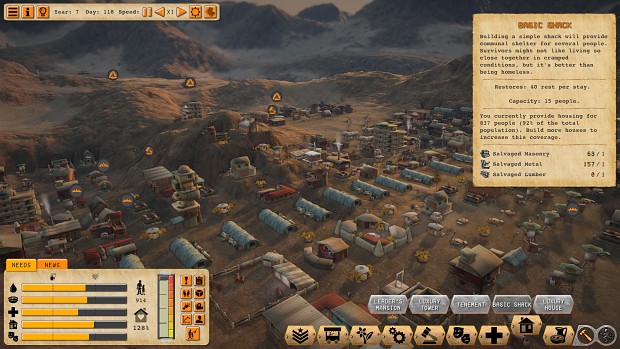
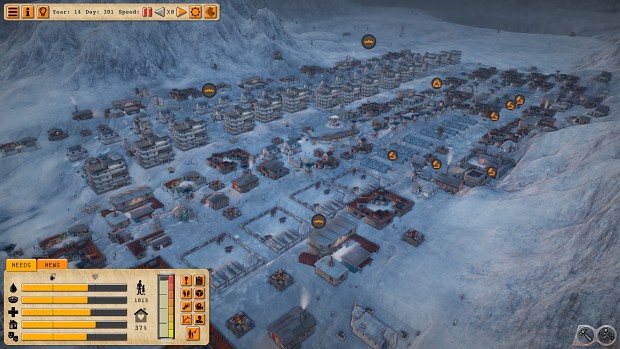
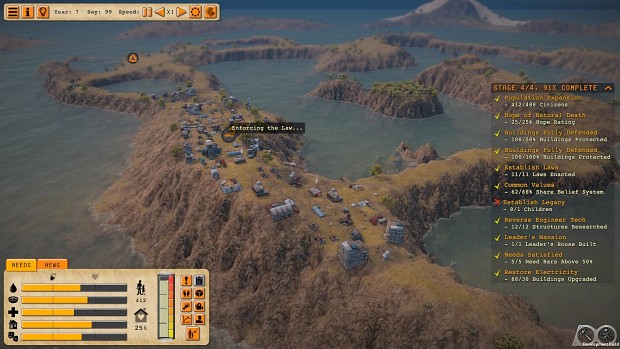







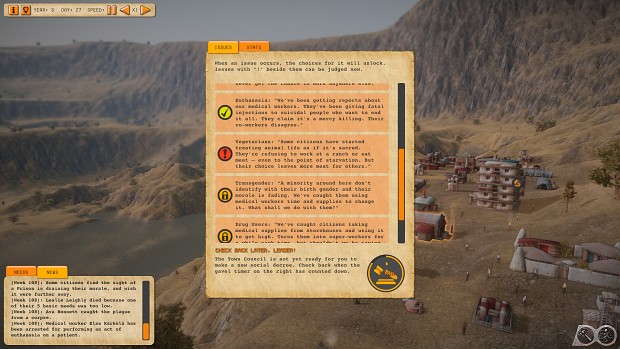

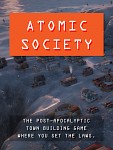









This game looks VERY interesting. I will DEFINITELY track this.
Thanks for your interest. :-)
When you can play?
You can play today at Farroadgames.com or wait for the Steam version later in 2017. :)
looks interesting i will follow this game :)
Hi
I am quite far in the game. I have 300 plus peopl etc. I noticed in the tips (i think tip 13 or 14) it says give better food later in the game via better food buildings. How do I get the better buildings? I have built green houses and live stock but dont see anything else for food.
Please help
thanks
This comment is currently awaiting admin approval, join now to view.
Awful unfinished game, this is not even in beta, its just dev demo to show "something". Spare your time and nerves skip it.
I know this might be a bit of a far fetch, but me and all my friends would love this game to be multiplayer and have military type units that you train and construct. Sort of like what anno is but still being its entirely own thing!...
cool is the steam page out? beta? or buy? I want to help support this :)